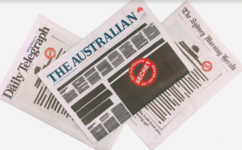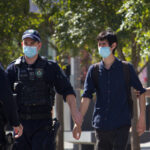Mainstream Media Finally Stands Up!

After being targeted by the recent AFP press raids, journalists and media organisations are finally standing up against years of laws which – while passed under the guise of protecting against terrorism – are actually being used to silence critics of governmental misconduct.
The proliferation of “loosely drafted” anti-terrorism laws has seen critical publications criminalised, including reports that are factual and in the public interest.
The Australian Financial Review and the Australian, among other national mastheads, have responded to these laws – which have so far led to the arrests of News Corp journalists – with a series of frontpage headlines this week.
Description of current laws by members of the newly formed Right to Know Coalition among others, have ranged from “absurd”, to “overly comprehensive”, to “threatening the integrity of our democracy”.
They point out that reporting on allegations of abuse that formed the backbone of two major Royal Commissions would not have been possible if it weren’t for media freedom, and are fearful the tightening noose on Australian press freedom will prevent criticism of abuses by not only government bodies, but other organisations as well.
The overarching message from media organisations is unanimous and clear: remove the threat of criminal prosecution and let us do our jobs.
Gone too far
Following the 9/11 terrorist attacks, 82 separate pieces of ostensibly anti-terrorism legislation have been enacted in Australia, and there are several more under review.
Many of the laws are broadly drafted and highly-punitive, and have already led to the censorship of important public interest matters. For example, there are laws which make it a crime to publicly speak about and/or report on anti-terrorism raids, even in circumstances where law enforcement agents commit unjustified and heinous crimes during those raids, as well as laws which criminalise those who report about human rights abuses in offshore detention centres and prescribe prison sentences for whistleblowers who report crime and corruption in government.
“There are so many facets and intricacies to the legislation out there now, it is hard to keep abreast with it,” national security expert, Professor John Blaxland, tells Sydney Criminal Lawyers.
“Anybody could get tripped up by the whole swag of provisions. In my opinion, there is a definite need for an audit and streamlining of the legislation.”
AFP raids
Indeed, earlier this year Federal police raided the home of Annika Smethurt for allegedly reporting about matters that were leaked to her by a whistleblower. The possibility of her criminal prosecution has still not yet been ruled out and, as a result, media organisations say journalists are wary of doing their jobs and reporting matters that are in the public interest.
They report that the censorship is making it easier for governments to act against the public interest and even commit crime and engage in corruption with impunity.
Threat to democracy
While some of this secrecy is necessary to protect national security, Professor Blaxland reminds us that, “absolute power can corrupt”.
“Of course, there are genuine concerns about the leakage of sensitive information, which could be harmful to national interests.
“But then again, there are legitimate concerns about the need to communicate when people are abusing the system.
“We need to think about how we can empower people to feel they have a place where they can vent where they see maladministration.”
Indeed, the media has been pivotal in exposing misconduct and corruption including instances of elder abuse at government-owned nursing facilities – such as Oakden Nursing Home in Adelaide, which led to the suspicious deaths of residents.
The weight and magnitude of reporting on these sorts of scandals was in part what led to a Royal Commission into Aged Care being called in October 2018.
Governments have responded
Governments have already responded to the escalating media uproar and there are two parliamentary inquiries underway. The Attorney General has also ordered that he must personally sign off all prosecutions against journalists.
On Sunday, Prime Minister, Scott Morrison, told reporters in Jakarta, “We’ll always believe in the freedom of the press, it’s an important part of our freedoms as a liberal democracy.
“[We] also believe in the rule of law and that no-one is above it, including me, or anyone else, any journalist or anyone else.
But his comments didn’t sit well with journalists, particularly Campbell Reid of News Corp who said the Right to Know campaign was never about journalists wanting to be above the law, rather to have the right to report on important information that the public needs to know.
Renowned expert and media freedom advocate, Professor Peter Greste, has also disputed the AG directive and said it is important for such matters to not be at the “whim of a politician”.
Revitalising the system
Experts are calling for new amendments or provisions to the current legislation. Professor Greste, has proposed a media freedom act which he says could give courts a benchmark when adjudicating on journalist prosecutions and also inform the drafting of new national security legislation.
Professor Blaxland adds, “By and large journalists today have a sense of propriety and legality. They are respectable people; it’s an honourable occupation; and important arm of civil democratic society.
“We have a shortfall on the protections for whistleblowers today. The Administrative Appeals Tribunal (AAT) has become less effective over time – as has the DSMA Notice system with the sheer number of competing media outlets.
“We need to work hard to revitalise the AAT and give it its teeth back.
“The time has come to reflect, in an unrushed manner, on how we can consolidate these competing matters and then explain that to the Australian people.”







